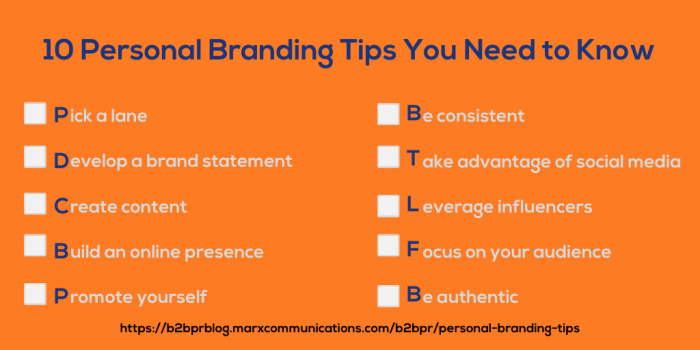Personal Branding Tips: In a world where standing out is key, crafting a strong personal brand can be your ticket to success. From defining your unique value proposition to leveraging social media, these tips will guide you on the path to personal branding mastery.
Importance of Personal Branding
Personal branding is key in today’s competitive landscape because it helps individuals stand out from the crowd, showcase their unique skills and personality, and create a strong reputation in their industry. In a world where first impressions are often made online, having a well-defined personal brand can make a significant difference in career opportunities and professional growth.
Successful Examples of Personal Branding
- Elon Musk: Known for his innovative thinking and entrepreneurial spirit, Musk has built a personal brand that is synonymous with cutting-edge technology and forward-thinking ideas.
- Oprah Winfrey: With her authenticity, empathy, and leadership skills, Winfrey has created a personal brand that resonates with millions of people worldwide, leading to immense success in various industries.
- Gary Vaynerchuk: A master of personal branding, Vaynerchuk has leveraged social media platforms to build a strong online presence and establish himself as a thought leader in marketing and entrepreneurship.
Impact of Personal Branding on Career Growth, Personal Branding Tips
Personal branding can have a significant impact on career growth by helping individuals attract new opportunities, build valuable connections, and establish credibility in their field. When people have a clear personal brand that showcases their expertise and values, they are more likely to be recognized and sought after for exciting projects, collaborations, and career advancements.
Building Your Personal Brand: Personal Branding Tips

Building your personal brand is essential in today’s competitive landscape. It helps you stand out, attract opportunities, and build credibility in your industry. Here, we will discuss how you can define your unique value proposition, create a consistent brand image, and the importance of authenticity and transparency.
Defining Your Unique Value Proposition
To define your unique value proposition, consider what sets you apart from others in your field. Ask yourself:
- What are your strengths, skills, and experiences that make you unique?
- What problems can you solve for your target audience?
- How do you want to be perceived by others?
Identifying these key points will help you craft a clear and compelling value proposition that differentiates you from the competition.
Creating a Consistent Brand Image
To create a consistent brand image across different platforms, follow these strategies:
- Use the same bio, profile picture, and cover photo on all your social media profiles.
- Develop a consistent color scheme, font style, and tone of voice for your content.
- Create branded templates for your graphics and visuals to maintain a cohesive look.
Consistency is key to building brand recognition and trust with your audience.
The Role of Authenticity and Transparency
Authenticity and transparency are crucial in building a personal brand that resonates with your audience. Be genuine and true to yourself in everything you do:
- Share your story, values, and beliefs openly with your followers.
- Admit your mistakes and show vulnerability when appropriate.
- Engage with your audience authentically and respond to feedback openly.
By being authentic and transparent, you build trust and loyalty with your community, ultimately strengthening your personal brand.
Content Creation and Strategy

Creating high-quality content is essential in shaping your personal brand and establishing yourself as an authority in your field. Your content acts as a reflection of your expertise, values, and personality, helping you connect with your audience on a deeper level.
Engaging and Valuable Content Tips
- Know your audience: Understand who your audience is and what they are interested in to tailor your content to their needs.
- Be authentic: Share your unique perspective, experiences, and insights to differentiate yourself from others in your niche.
- Create consistent content: Develop a content schedule and stick to it to maintain engagement and build trust with your audience.
- Add value: Provide useful information, tips, and solutions that your audience can apply in their own lives or work.
- Engage with your audience: Encourage feedback, comments, and discussions to foster a sense of community around your content.
Different Content Formats for Personal Branding
- Blog posts: Share in-depth articles, thought leadership pieces, and personal stories to showcase your expertise and insights.
- Videos: Create engaging video content, tutorials, interviews, or vlogs to connect with your audience visually and audibly.
- Podcasts: Host a podcast where you discuss industry trends, share interviews with experts, and provide valuable insights through audio content.
- Social media posts: Utilize platforms like Instagram, Twitter, LinkedIn, and Facebook to share bite-sized content, updates, and engage with your audience in real-time.
Leveraging Social Media for Personal Branding
In today’s digital age, social media has become a powerful tool for personal branding. With the right strategies, you can effectively showcase your skills, expertise, and personality to a wide audience. Let’s dive into how you can leverage social media for personal branding.
Choosing the Right Social Media Platforms
When it comes to personal branding, it’s essential to choose the right social media platforms that align with your goals and target audience. Consider the following tips:
- Identify your target audience: Understand who you want to reach and where they are most active online.
- Research platform demographics: Different social media platforms attract different demographics. Choose the ones that best fit your target audience.
- Focus on quality over quantity: It’s better to have a strong presence on a few platforms than to spread yourself too thin across multiple.
Optimizing Social Media Profiles
Your social media profiles serve as your online identity, so it’s crucial to optimize them for a strong personal brand. Here are some tips:
- Use a professional profile picture and cover photo: Choose images that reflect your personal brand and are visually appealing.
- Craft a compelling bio: Write a concise yet engaging bio that highlights your expertise and personality.
- Keep branding consistent: Use the same color scheme, fonts, and tone of voice across all your social media profiles.
Dos and Don’ts of Using Social Media for Personal Branding
When leveraging social media for personal branding, it’s important to be mindful of how you present yourself online. Here are some dos and don’ts to keep in mind:
- Do: Engage with your audience regularly, share valuable content, and showcase your authentic self.
- Don’t: Overshare personal information, engage in controversial topics, or post anything that may damage your reputation.
- Do: Use hashtags strategically to increase visibility and reach a wider audience.
- Don’t: Buy followers or engagement, as it can harm your credibility in the long run.
Networking and Building Relationships
Building relationships and networking play a crucial role in enhancing your personal brand. By connecting with others, you can expand your reach, gain valuable insights, and establish credibility in your industry.
Strategies for Building Meaningful Relationships
Building meaningful relationships, both online and offline, is essential for strengthening your personal brand. Here are some strategies to help you build lasting connections:
- Attend industry events and conferences to meet like-minded individuals and potential collaborators.
- Engage with your audience on social media by responding to comments and messages in a timely manner.
- Join professional networking groups and communities to connect with professionals in your field.
- Offer value to others by sharing your expertise and helping them solve their problems.
- Follow up with people you meet to maintain relationships and explore potential opportunities for collaboration.
Tips for Leveraging Networking Opportunities
Networking opportunities can significantly impact your personal brand. Here are some tips to make the most out of networking events and interactions:
- Set clear goals for each networking opportunity to ensure you make meaningful connections.
- Prepare an elevator pitch that effectively communicates who you are and what you do.
- Listen actively to others and show genuine interest in their stories and experiences.
- Follow up with a personalized message or email after meeting someone new to nurture the relationship.
- Be authentic and honest in your interactions to build trust and credibility with your network.